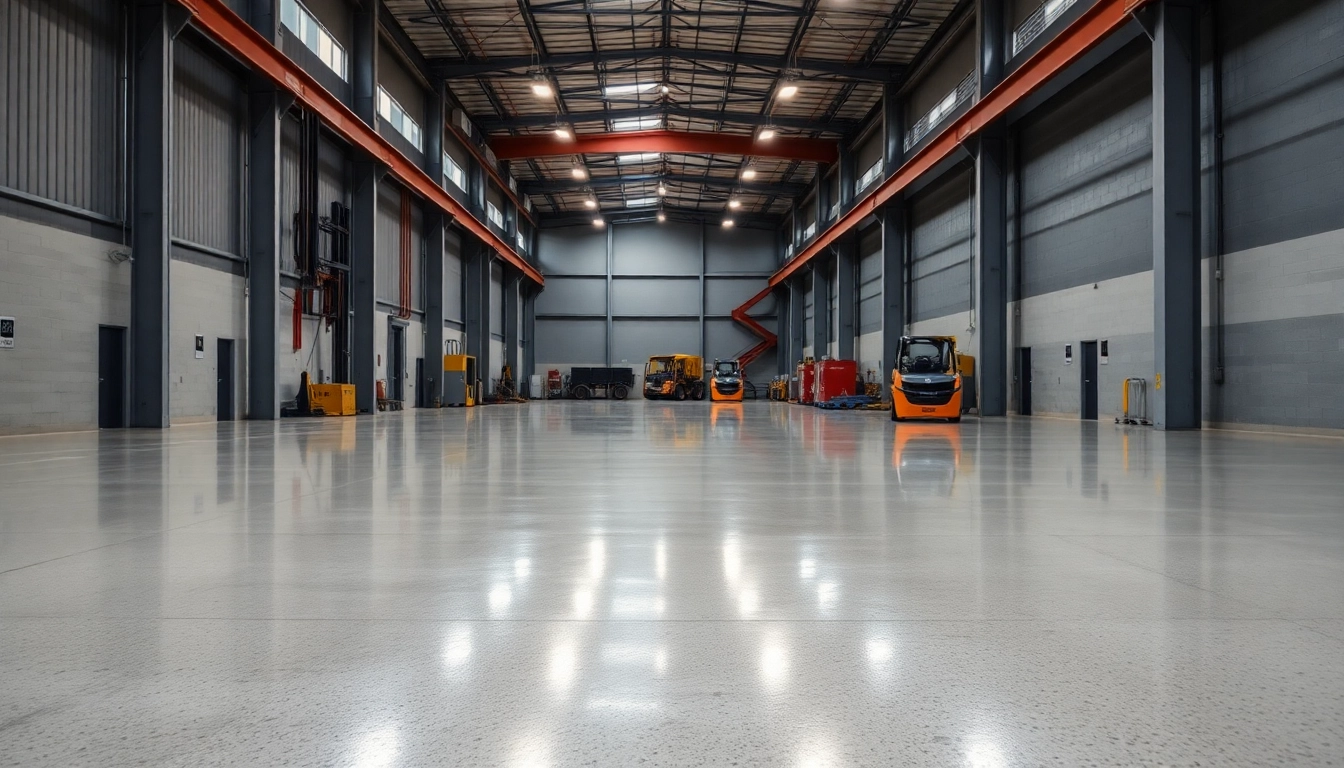High-Performance Epoxy Resin Flooring Solutions for Industrial Excellence

Understanding Epoxy Resin Flooring
What is Epoxy Resin Flooring?
Epoxy resin flooring is a high-performance flooring solution crafted from a mixture of epoxy resin and hardeners. This combination creates a tough, durable surface that is seamless and often used in industrial and commercial applications. The bonding properties of epoxy allow it to adhere exceptionally well to a variety of substrates, making it an excellent choice for new constructions as well as renovations. One prominent provider of such solutions is RB Grinding UK Ltd, known for its epoxy resin flooring installations tailored to specific industry needs.
Benefits of Choosing Epoxy Resin Flooring
Choosing epoxy resin flooring comes with a myriad of benefits. Here are some of the key advantages:
- Durability: Epoxy floors are resistant to heavy traffic, chemicals, and impact damage, ensuring they remain intact even under the strain of industrial use.
- Low Maintenance: These surfaces are easy to clean and do not require expensive maintenance routines.
- Aesthetic Versatility: Available in a wide range of colors and finishes, epoxy resin flooring can be customized to meet aesthetic requirements for any space.
- Seamless Finish: The continuous surface minimizes the risk of joint failure and makes for easy maintenance while enhancing hygiene.
- Safety Features: Anti-slip coatings can be integrated into the epoxy flooring to enhance safety in environments susceptible to falls.
Common Applications of Epoxy Resin Flooring
Epoxy resin flooring is utilized in various sectors, including:
- Manufacturing Facilities: The robust nature of epoxy is ideal for heavy machinery and wear-prone areas.
- Warehouses: Its resistance to chemicals and ease of cleaning make it suitable for storage spaces.
- Food Production: Hygienic floors that comply with health regulations can be achieved with specific epoxy systems.
- Commercial Spaces: Retail and restaurant environments benefit from the aesthetic flexibility and durability of epoxy.
Installation Process of Epoxy Resin Flooring
Preparation Steps for Epoxy Resin Flooring
Proper installation of epoxy resin flooring requires careful preparation, which involves several crucial steps:
- Surface Inspection: Conduct a thorough examination of the concrete surface for any underlying issues such as cracks, moisture, or structural concerns.
- Cleaning: The surface should be cleaned of all dust, dirt, grease, and oils to facilitate proper bonding.
- Drying: Ensure the surface is completely dry before proceeding with installation.
- Grinding: For optimal adhesion, the concrete may need to be ground down to create a rough texture, allowing epoxy to penetrate and bond properly.
Application Techniques of Epoxy Resin Flooring
Applying epoxy resin flooring involves multiple stages to ensure a high-quality finish:
- Mixing: The epoxy and hardener need to be mixed thoroughly according to the manufacturer’s specifications and guidelines.
- Priming: A primer coat may be applied to enhance adhesion, particularly if the substrate is porous or uneven.
- Pouring and Spreading: The mixed epoxy is poured onto the floor and spread evenly, ensuring it fills all gaps and crevices.
- Rolling: A roller is used to ensure the thickness is consistent and the surface is free of bubbles.
- Curing: The area is then allowed to cure fully based on the manufacturer’s recommendations.
Post-Installation Care for Epoxy Resin Flooring
After installation, proper care is essential to ensure long-lasting performance. Important practices include:
- Avoid Excess Weight: Do not place heavy objects on new flooring until completely cured.
- Regular Cleaning: Use a mild detergent and soft mop for routine cleaning; avoid harsh chemicals that can degrade the epoxy over time.
- Inspection: Regularly inspect the floor for signs of wear, peeling, or discoloration.
Choosing the Right Epoxy Resin System
Types of Epoxy Resin Flooring Systems
There are several types of epoxy resin flooring systems, each designed to meet specific needs. Common types include:
- Solid Epoxy: A traditional and widely used option known for its strength and durability.
- Epoxy Mortar: Combines epoxy with aggregates for heavy-duty applications and repairs.
- Quartz-Filled Epoxy: An aggregate-filled molten epoxy that creates non-slip surfaces suited for wet environments.
- Self-Leveling Epoxy: Designed for smooth, even finishes across uneven substrates.
Factors to Consider When Selecting Epoxy Resin Flooring
When choosing the right epoxy system, consider:
- Purpose of Space: Identify if the area will bear heavy machinery, require hygiene, or be subjected to chemical spills.
- Environmental Conditions: Evaluate temperature variations, moisture levels, and exposure to sunlight.
- Aesthetic Preferences: Decide on colors and finishes that align with the desired look of the space.
- Maintenance Needs: Consider how easy it is to clean and maintain different flooring types.
Cost Analysis of Different Epoxy Resin Flooring Options
The cost of epoxy resin flooring can vary based on several factors:
- Materials: Depending on the system selected (solid, quartz-filled, etc.), costs can fluctuate significantly.
- Installation: Labor costs are influenced by the complexity of the installation and the size of the project.
- Additional Features: Incorporating anti-slip features or decorative elements can increase the total expenditure.
- Long-Term Value: While initial costs may be high, considering longevity and durability can result in cost savings over time.
Maintaining Epoxy Resin Flooring
Routine Cleaning Practices for Epoxy Resin Flooring
To keep epoxy resin flooring looking pristine and functioning optimally, employ these cleaning practices:
- Sweep and Dust: Regularly sweep the floor to remove dirt and debris.
- Mopping: Use a damp mop with a mild cleaner to prevent build-up of grime.
- Spot Cleaning: Address spills immediately by blotting them up and cleaning with suitable cleaning products.
Long-Term Maintenance Tips for Epoxy Resin Flooring
For long-term maintenance, consider the following best practices:
- Avoid Abrasive Cleaners: Stay away from harsh chemicals that could scratch or damage the surface.
- Monitor Traffic: Limit heavy traffic immediately after installation to allow for proper curing.
- Inspect Regularly: Look out for peeling or cracks that could necessitate professional attention.
Signs of Wear and When to Reapply Epoxy Resin Flooring
Understanding when to reapply or touch up epoxy resin flooring helps maintain safety and aesthetics:
- If the surface becomes dull or discolored.
- Visible cracks or chips appear that compromise the integrity of the surface.
- If water begins to pool in areas that were once well-draining.
- When there are signs of wear around high-traffic zones that could lead to safety hazards.
Frequently Asked Questions about Epoxy Resin Flooring
How Durable is Epoxy Resin Flooring?
Epoxy resin flooring is renowned for its durability, being resistant to scratches, impacts, and chemical spills. It is designed to resist the wear and tear common in high-traffic environments, making it suitable for industrial and commercial use.
Can Epoxy Resin Flooring be Customized?
Yes, epoxy resin flooring can be customized in various colors, textures, and finishes, allowing businesses to align their flooring aesthetics with their brand identity or application needs.
What are the Safety Standards for Epoxy Resin Flooring?
Epoxy resin flooring can meet various safety standards such as slip-resistance ratings and VOC emissions requirements. Ensuring that your materials meet industry standards is crucial for maintaining a safe environment.







